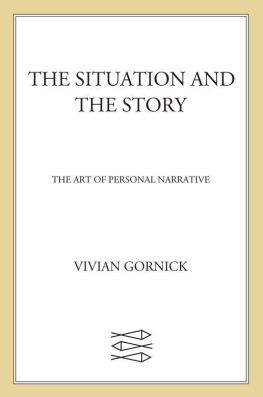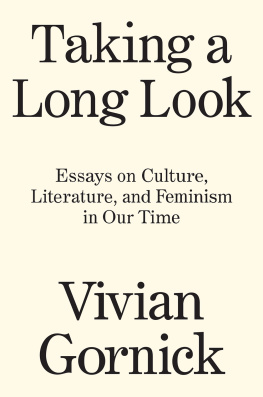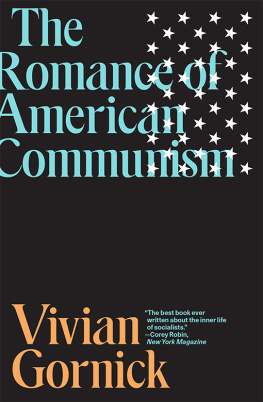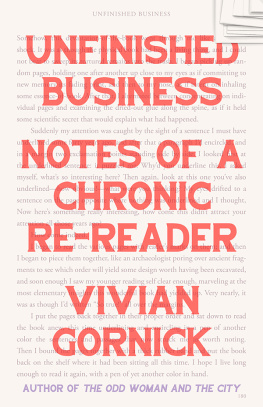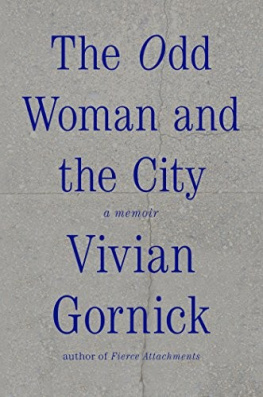THE MEN IN MY LIFE
THE MEN IN
MY LIFE
Vivian Gornick
A Boston Review Book
THE MIT PRESS Cambridge, Mass. London, England
Copyright 2008 Massachusetts Institute of Technology
All rights reserved. No part of this book may be reproduced in any form by any electronic or mechanical means (including photocopying, recording, or information storage and retrieval) without permission in writing from the publisher.
MIT Press books may be purchased at special quantity discounts for business or sales promotional use. For information, please e-mail or write to Special Sales Department, The MIT Press, 55 Hayward Street, Cambridge, MA 02142.
This book was set in Adobe Garamond by Boston Review and was printed and bound in the United States of America.
Library of Congress Cataloging-in-Publication Data Gornick, Vivian.
The men in my life / Vivian Gornick.
p. cm.
"A Boston Review book."
ISBN 978-0-262-07303-5 (hardcover : alk. paper)
1. American literatureHistory and criticismTheory, etc. 2. English literatureHistory and criticismTheory, etc. 3. AuthorshipPsychological aspects. 4. Social problems in literature. 5. Male authorsAppreciation. 6. Authorship Sex differences. 7. Literature and society. I. Massachusetts Institute of Technology. II. Title.
PS25.G67 2008
810.9dc22
2008022927
10 9 8 7 6 5 4 3 2 1
PREFACE
IN SCHOOL, THE TEACHER HELD A COMPOsition of mine up to the class when I was eight years old and said, This little girl is going to be a writer. At homewhere Marx, socialism, and the international working class were articles of faithmy mother pressed my upper arm between two fingers and said, Never forget where you come from. Both events were formative. I grew passionate over writing, and the political-ness of life was never lost on me. In my youth these twin influences made me suffer. I thought them hopelessly oppositional, and was tormented by the suspicion that ultimately I need choose one way of knowing the world over the other. It was literature that spoke most thrillingly to what I was already beginning to call the human condition, but when social injustice stared me in the face it was easy enough to trade in emotional nuance for doctrinaire simplicity. So one day it was exciting to say to myself, The only reality is the system; the next, Id pick up Anna Karenina, and the sole reality of the system would do a slow dissolve.
I entered college, and somewhere in my junior year something interesting happened: a drama of internal anguish that subsumed all else began to unfold. The words anxiety and depression entered my vocabulary. Conflicts I had never before paid attention to became alarming. In no time at all an unimagined universe of interiority opened before me, one equipped with its own theory, laws, and language, and constituting a worldview that could account for: everything. This was strong stuff. Under its influence, both literature and politics began to lose their either/or power over me. I didnt stop reading, and I didnt stop signing petitions, but I no longer felt commanded to choose.
Then, before I knew it, it was 1970, and feminism was standing boldly on the horizon, urging me to take in its wisdom. The unlived lives of women began to seem not simply a drama of the psyche, but a crime of historic intent that could be solved only through a movement for social justice. This was an insight that, to every generation of feminists since the Enlightenment, had come like Revelation; and, like Revelation, it lit up a converts sky, coloring every feature of the human landscape. The kaleidoscope of life had been shaken and all the familiar pieces now formed a new design, one that illuminated the way we spoke, read, thought, and wrote. Keep looking through that prism, we told ourselves, and wed have every explanation ever needed. Then, problematically, the design complicated itself once more.
Although the rhetoric continued to run high, soon enough 70s feminists came to realize that while they stood united in political analysis, ideology alone could not purge them of the pathological self-doubt that seemed every womans bitter birthright. For that, another kind of struggle was required: one for which a man, not a woman, supplied the tag line. As Anton Chekhov so memorably put it, Others made me a slave but I must squeeze the slave out of myself, drop by drop.
Suddenly, literature, politics, and analysis came together, and I began to think more inclusively about the emotional imprisonment of mind and spirit to which all human beings are heir. In the course of analytic time, it became apparent thatwith or without the burden of social justicethe effort required to attain any semblance of inner freedom was extraordinary. Great literature, I then realized, is a record not of the achievement, but of the effort.
With this insight as my guiding light, I began to interpret the lives and work of women and men alike who had spent their years making literature. But it was in the lives of the men, especially, that one could see what it meant to wrestle with the demons. Here they weretalented, often brilliant, with infinitely more permission to do and be than women had ever knownand they were endlessly dragged about by conflicts they could neither give up nor bring under control. I could not but be movedby the great and the humble aliketo pity and admiration for those who demonstrated repeatedly that to be and do is not a given.
V. S. Naipaul has, very nearly, been consumed by the raging self-hatred that powers his work; George Gissing labored under an equally strong self-loathing that made social exile his natural milieu. Randall Jarrell fed a passion for poetry on the fever of a defensive brashness that drove him, ultimately, into suicidal despair. While Loren Eiseley made anthropologic poetry out of an isolating depression of monumental proportions, Allen Ginsberg became a holy fool, and Dubus, Carver, and Ford licked their sentimentalized wounds in story after story. Then, of course, there are Saul Bellow and Phillip Roth, who have each produced brilliance upon brilliance out of an unremitting fury that he was born into a culture that persisted in telling him he had no right to measure up; theirs is a fiction that for forty years has screamed, Dont tell me I dont run things around here! Againstor because of, or in spite of, who knows?such disability, each and every one of these writers has converted neurotic necessity into literary virtue, and achieved work of lasting value that casts light on the time in which it was conceived.
If, indeed, criticism is autobiography, this book, then, is a collection of essays written in appreciation of the working lives of literary men by a woman whose critical faculties have been shaped by a passion for literature, a hard-won knowledge of inborn anxiety, and a compelled devotion to liberationist politics. It is this last, I think, that is most responsible for the perspective vital to the making of these essays. The re-awakening in my late youth of the centuries-long struggle for womens rights clarified the intimate relation between literature, emotional damage, and social history; made evident to me the organic nature of all that is meant by the word culture. It is my great hope that the reader will experience the development of this perspective as I have: as an enrichment of the writing and reading experience.
THE MEN IN MY LIFE
George Gissing:
A Neurotic for Our Times
ONE OF THE GREAT NEUROTICS AMONG nineteenth-century English urban novelists is George Gissing, a writer whose damaged ego forced him into an isolation of his own making from which, paradoxically, came books of immense social intelligence, motivated by the keenest of psychological insights. These insights were the reward of a literary man whose private torments had the great good luck to mesh with a world of realities only too happy to mirror his troubled soul. Gissings twenty-two novels, invariably set in the misery brought on by the Victorian caste systemnamely, the unhappiness meted out to those born with brains and temperament, but neither money nor connectionare nearly all riddled through with the entrenched melancholy of a protagonist bent on nursing a lifelong sense of deprivation. No one could brood as profitably as he on the failings of a system that regularly drove men and women of merit into the emotional incapacity that ensures spiritual isolation. We know this character. He speaks to us. His angry, brilliant projections remind us of the intimate relation between neurosis and actuality, exactly as we might experience it.



